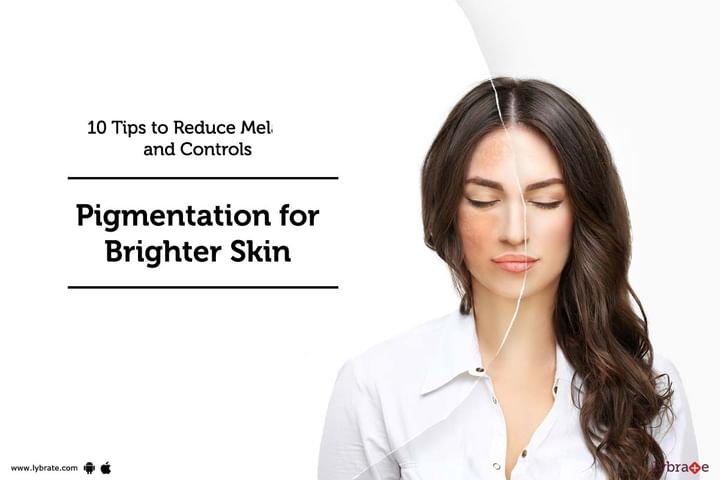10 Tips to Reduce Melanin and Controls Pigmentation for Brighter Skin
The pigment which is responsible for the black colour of our hairs, skin and eyes is called melanin. Every person has a different skin colour. To understand why there is a difference of skin colour from person to person we must know about the layers of the skin. The epidermis contains two types of cells the keratinocytes and the melanocytes. The melanocytes are present at the base of the epidermis and responsible for the production of melanin pigment. The Melanosomes are the melanin factory inside the melanocytes.
When the melanin is produced in large amounts, it leads to darker skin colour. The most common cause of overproduction of melanin is unprotected prolonged exposure to sunlight whereas the genetic factors also affect the amount of melanin production in a person. When due to certain factors there is overproduction of melanin in certain areas of the skin leading to darkening of that area or discoloration of that area, it is termed as pigmentation or hyperpigmentation.
Today we are going to share some tips to reduce melanin and control pigmentation for Brighter Skin–
1– The most simple and easiest way to limit the production of melanin and to reduce pigmentation is to stay indoors in the afternoon when the sun is vertically overhead and causes maximum damage to the skin. Actually the melanocytes protect our skin from the harmful rays of the sun by producing more melanin. So if our skin is exposed to sunlight more melanin is produced and the skin appears darker.
2– In case you go out in the sun, always wear protective covering to minimise the damage from the damage caused by the harmful rays of the sun. Try covering not only the face but all the exposed parts of the body.
3– The most helpful thing to prevent Pigmentation are sunscreens. They are your best friends. You should apply sunscreen at least three times a day. You should apply it even if you are indoors as the rays of the sun cannot be stopped completely from entering the house.You should be wise in choosing your sunscreen. You should keep in mind the SPF of the sunscreen. SPF refers to the sun protection factor. Dermatologists consider a sunscreen of at least SPF 30 to be good. However sunscreens do not give full protection to the skin and protective clothing is must. A sunscreen of SPF 30 blocks about 97 percent of the UV radiations whereas SPF 50 blocks about 98 percent of the UV radiations.
The sunscreen should be of broad spectrum, should be non oily and easily absorbable by the skin. It should not contain harmful chemicals. It should be resistant to water so that the water does not wash away the sunscreen at once leaving you exposed to sunlight.
Also, you should apply sunscreen at least thirty minutes before going out in the sun giving it enough time to be absorbed by the skin.
4– Use of Turmeric– Turmeric can be used on the skin in certain face packs prepared at home to reduce pigmentation. Certain researchers have demonstrated that turmeric helps in reducing pigmentation to a greater extent.
5– Use of aloe vera– Aloe vera gel has been an all rounder from the beginning. It is helpful in almost all sorts of problems. It contains a compound called aloin which is helpful in suppression of tyrosinase which further leads to reduction in the production of melanin.
6– Use of lemon juice– As we all know lemon juice contains vitamin C which is good for the skin, studies have found that it helps in reducing pigmentation as well. But it could be harsh on the skin, so always use it by diluting it in water and avoid sunlight for some time after its use.
7– Green tea– researchers have showed that green tea is also helpful in reducing pigmentation of the skin but we don't have proper evidences to support the fact but there is no harm in using it as we all know that it will not cause any problem.
8– Dermatologists recommend some prescription creams for reducing pigmentation. One of the main components used in such creams is hydroquinone which acts as a bleaching agent for the skin and helps in reduction of the dark patches however these creams should be used only under medical supervision and only for a specified period of time. Prolonged use of such topical ointments might cause damage to the skin.
The sun exposure must be reduced while the use of such creams because they reduce melanin production in the skin leaving the skin unguarded against the harmful rays of the Sun, so the dermatologists always prescribe sunscreens along with such ointments.
9– Chemical peels are a good option in the treatment of hyperpigmentation. It is a procedure in which the upper darker layers of the skin damaged by the sun are removed with the application of some chemicals revealing the lighter layer of the skin underneath. However the lighter layer underneath is highly sensitive to sunlight and can be damaged easily by the rays of the sun and should be taken care of.
In case the chemical peels do not give good results the dermatologist recommend laser therapy which involves the removal of the dark patches through lasers.
10– A good diet is very important for brighter skin. Avoid junk food. Avoid smoking and limit alcohol intake as they can aggravate your symptoms of hyperpigmentation. Include Vitamin C and Vitamin E rich foods in your diet which is very good for your skin. Vitamin C also contains antioxidants important for the even skin tone. They also help in collagen production.
Conclusion–
In the end, we hope that this article was helpful to you. It is important to consult a doctor if you face any serious or severe problem. Thank you so much for giving your precious time to read this article.



+1.svg)
